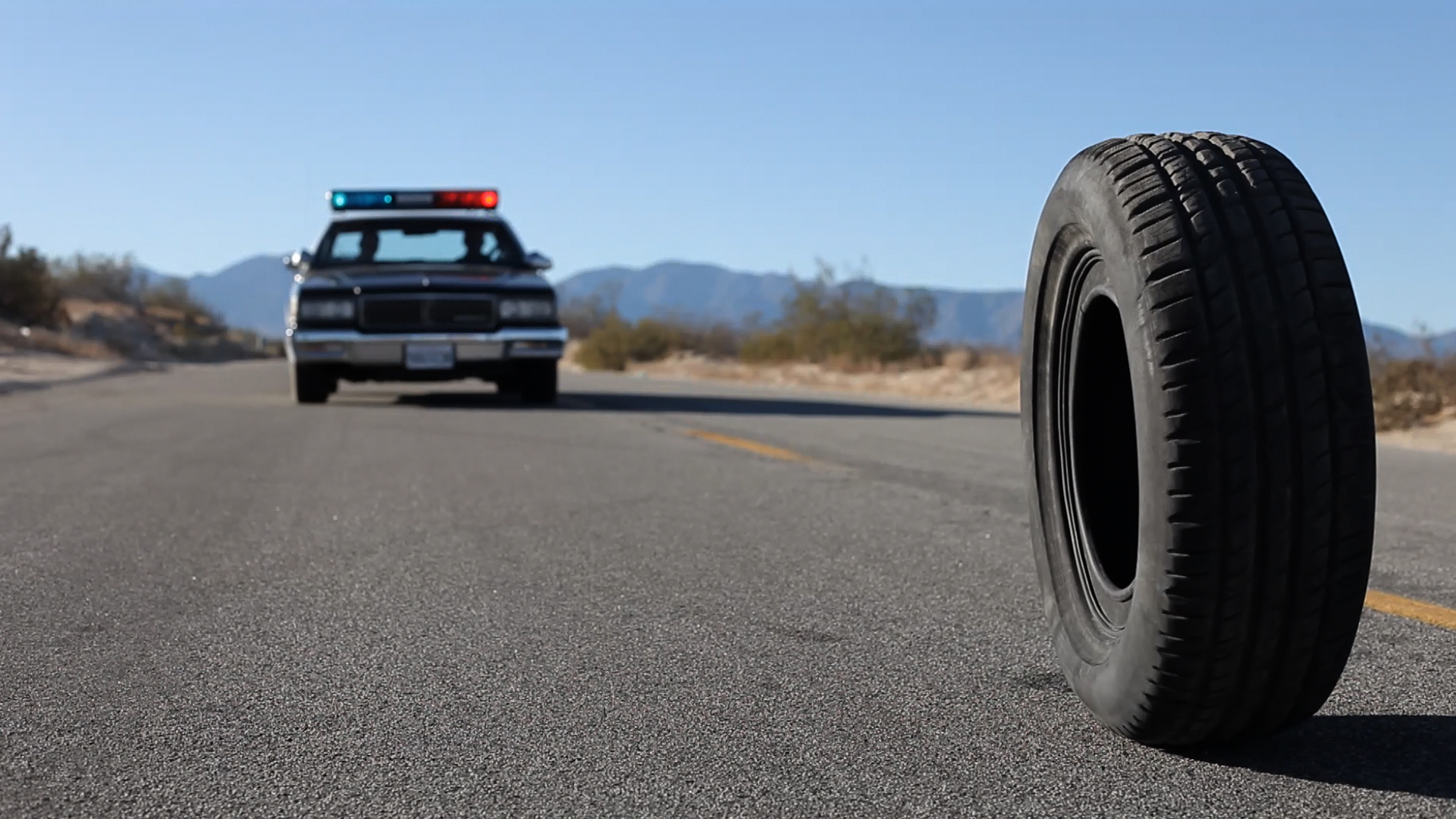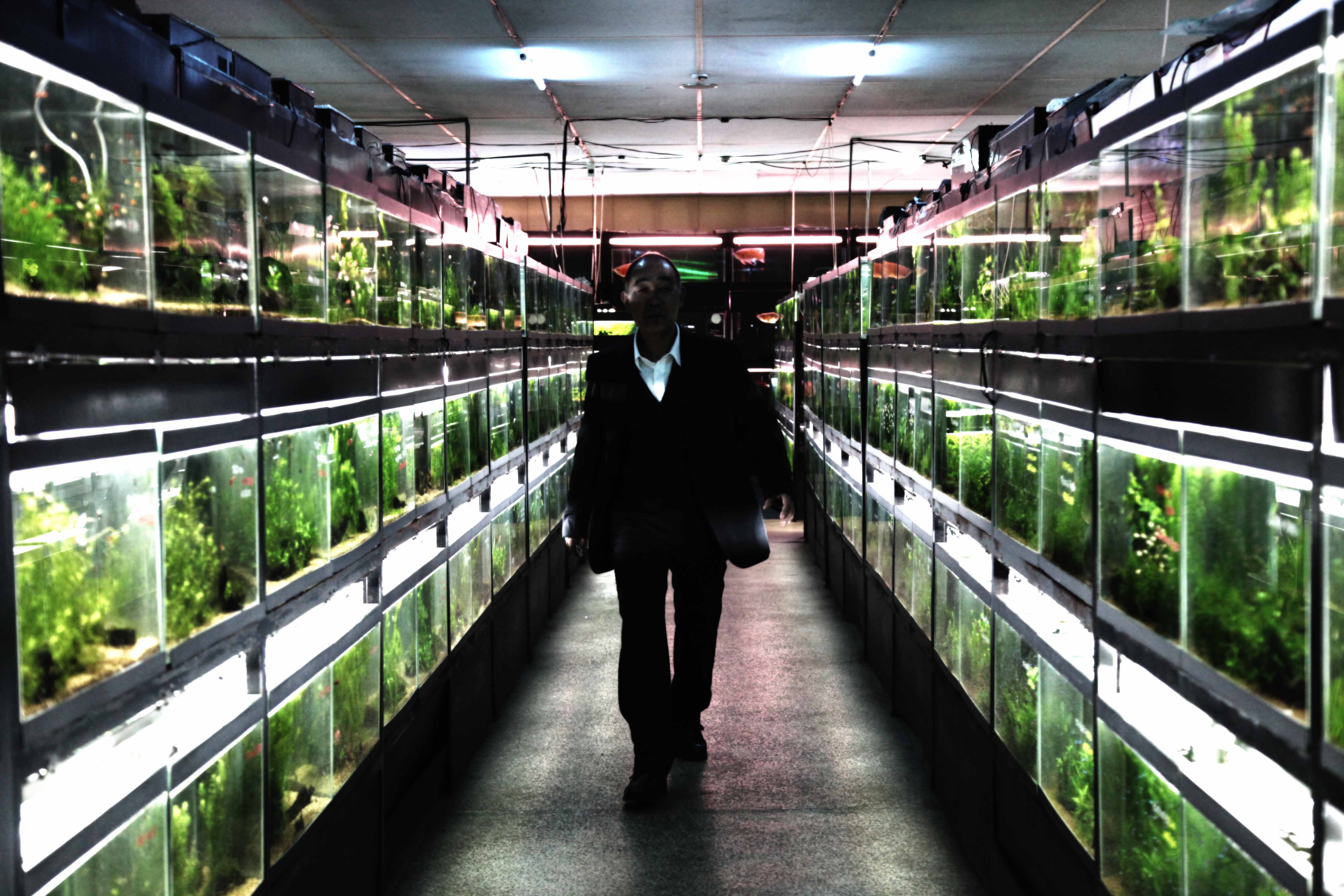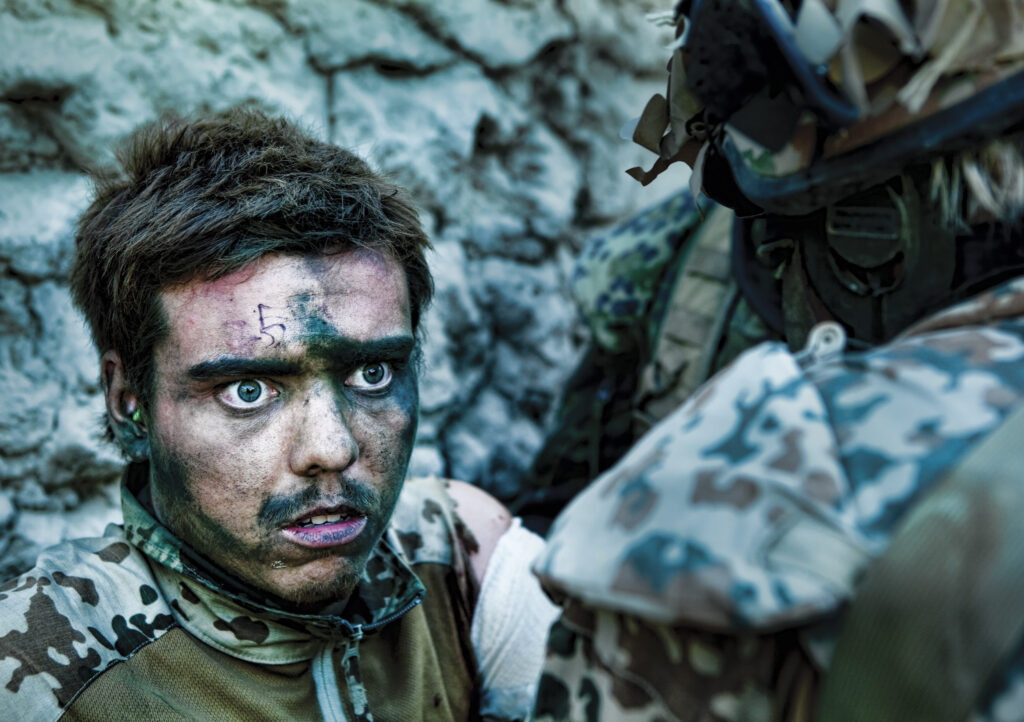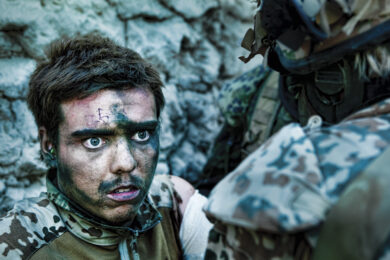Armadillo
Janus Pedersen’s gripping fly-on-the-wall documentary of a group of young Danish soldiers sent to Afghanistan shows how sincerity and camaraderie can be disrupted by the strains of war. Following the soldiers as they depart from their families, Armadillo begins in a sentimental tone and continues as a gentle yet absorbing insight into the day-to-day lives of the soldiers as they patrol the region, train for combat and bond. Part of its charm is that it sits in total contrast to the (purposely sensationalist) footage of American soldiers with which we’re so familiar, as they blast out nu-metal and clobber anything that has the temerity to be foreign. In the Danish camp, meetings are lead in earnestness. The hierarchy isn’t distinguished by pomposity or shouting volume, but by a respectful attention.
In the camp, the soldiers could almost have been devised and arranged by an astute sitcom writer: the quiet contemplator, the nerd, the boisterous jock. With their strenuous situation adding sympathy, there’s no-one to whom you take a dislike.
As the soldiers set out to patrol the surrounding area and greet the local Afghan villagers, the complexity of maintaining peaceful relations becomes apparent. Living in fear of having their heads removed by the Taliban, the locals are somewhat reluctant to be seen giving information to the ‘invading’ soldiers. On top of that, the Taliban traditionally don’t adorn themselves in uniforms or wear name badges professing their identity, so spotting them becomes quite tricky. As anyone could be concealing a gun underneath their baggy clothing, the soldiers’ sense of isolation and unease reaches out from the screen and warms you even more to them, if not their plight.
The up close coverage is quite remarkable, and at times you can’t believe this is actually a documentary and not fictional as the camera gets right up against the gun fights, capturing the breath and panicked detail of the soldiers’ faces. Though there is always going to be a certain amount of acting up to camera, their ubiquity eventually means the soldiers let their guard down, especially as their guard is raised and focussed elsewhere.
The game changer comes during a particularly intense battle with Taliban soldiers, when the rush of adrenaline brings out a hidden viciousness in a couple of the soldiers. Given the lack of commentary, you’re left to make your own mind up about whether certain actions are justified by the stresses of war.
In the fall out from the battle, one particularly tall and fun loving Dane is awarded a medal of bravery for risking his life to lob a grenade into a pit of Taliban fighters, which you get an intimate view of. For days after, he retells every detail with increased glee and excitement while others look on with vague concern.
The genius of Armadillo is mainly in the editing. After creating a pack mentality with these soldiers, you’re then dragged into an ethical quagmire weighted by this quasi-personal attachment. It’s well worth watching, if not for its engaging story, then for its uniquely revealing footage of life on the frontline.
Rubber

What may have started off as an hilarious idea late one evening after too much wine doesn’t really have the legs to carry it to full feature length; Rubber, written and directed by French record producer Quentin Dupieux (AKA Mr. Oizo), is a jaunty trash horror about a discarded truck tyre that’s somehow able to move by its own volition, and explodes anything that gets in its path using psychokinetic powers.
The whole film is drenched in a heavy irony that, even if it doesn’t rescue it, at least makes it more enjoyable. Rubber shouldn’t be totally discarded as a one-joke pony, and the humour that wafts from its self-aware absurdity is neatly mixed with some genuinely funny moments. An appealing surrealism pads out the entertainment, the most enjoyable aspect of which is the bending of the fourth wall. Rather than having the actors step towards the audience, the audience are placed within the film, observing and commenting on the action, squabbling over different interpretations of the action. The actors constantly cross the border from the storyline to the audience to create a lively dosido effect as the audience become part of the narrative.
It’s impressively realistic gore is softened somewhat by the constant references to the fact that it is, of course, all fake. Again, there are conversations between those sat outside the film-world speaking as actors to those inside the film-world who seem convinced that everything that’s happening is real. And the two worlds constantly invade each other.
It all makes for amusing scenarios as well as fanciful reflections on the relationship between film and audience, but it floats gently away under the lightness of its story. A film constructed purely to wax-theoretical is never going to hold interest for too long, and even at one hour and fifteen minutes it seems needlessly long.
Part of what makes Rubber hard to engage with is exactly what makes it sound appealing: that the central character is a murderous rubber tyre. When you’ve got a stone cold killer like Anton in No Country For Old Men, you’re given someone recognisably human behaving in a sadistic manner that is instinctively unhuman, so creating psychological tension. When you have a rubber tyre simply rolling around, occasionally stopping to wobble and blow things up, it really only holds your attention as a neat trick. So after a short while, like watching the same firework explode time after time, the novelty wears off. And then there’s nothing else to intrigue you about this monotonous act.
In short, it’s a quirky idea held together by some fun points of discussion, yet there’s not enough to warrant a feature length movie. It would have made a great short film, though.
Cold Fish

Horrifying violence can often be used to hack through to the deeper core of a story’s mystery. In the hands of a maniacal slash-happy director, it merely sprays a jism of bloodcore boredom on the screen to the grating squeals of some self-serving impersonation of depravity. Cold Fish, originally at least, is a mix of both.
Mitsuko lives in passive aggressive disharmony with her father Shamoto and stepmother Taeko, next to their exotic fish shop. When she is caught stealing from a supermarket, a charismatic local businessman, Murata, bails her out of trouble on the condition that she leaves her home and comes to work for him. Showering anyone in earshot with excessive compliments, the offer seems to good to refuse. Shamoto is near powerless to Murata’s requests, who has the swagger of an alpha male and owns a larger, more successful aquarium than he does.
Initially, there’s a great deal to like about Cold Fish. The larger than life Murata is so dementedly nice it’s impossible to guess what he’s up to, and the bizarre three way tug of war between father, daughter and step-mother wonderfully peels back a family history built on pent up resentment.
It doesn’t take log to realise that Murata’s wealth and success comes at quite a high cost. As soon as the lumbering metaphor of big fish freely eating little fish lurches into view, it’s a safe bet that some pretty strong Schopenhauerian themes are also going to make a stark appearance. And they do, somewhat over explicitly.
Manipulated by threats and rhetoric, the weak-minded Shamoto dives into Murata’s dark world. At first he has his family’s interests at heart, until he begins to get a taste for the seductive liberation and power that comes with unrestrained violence.
At which point Cold Fish starts to get rather bloody and gut-splattered to extreme levels. As bodies are hacked up, bones are crunched and organs are flung around like confetti, Cold Fish suddenly wades into slasher-porn territory. Much of it is quite difficult to watch, and scenes of wanton bludgeoning are repeated and dragged out far longer than seems necessary. After half an hour of seeing heads and livers sliced open and intestines playfully torn out and burnt, you’re forced to a crossroads where either numbing yourself or throwing up seem like the only safe options. In the latter, you miss the film; in the former, the bloodbath becomes pointless as it no longer elicits its intended response.
Under the mounds of human offal, Cold Fish is a well-worked story, but it would benefit from having a few less limbs lopped off and hacking quite a few more minutes from its running time instead.



